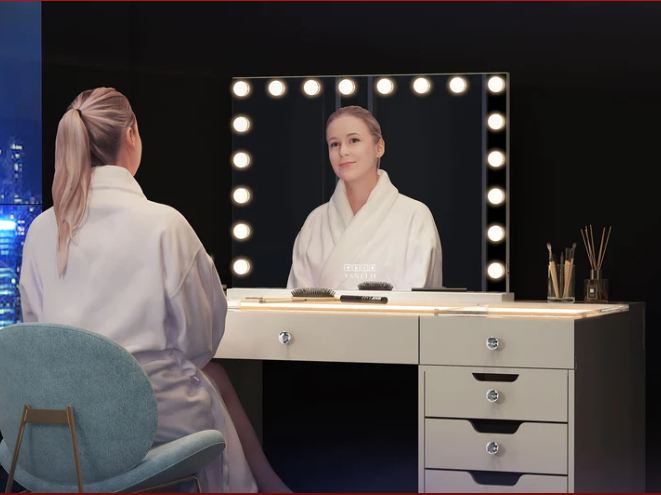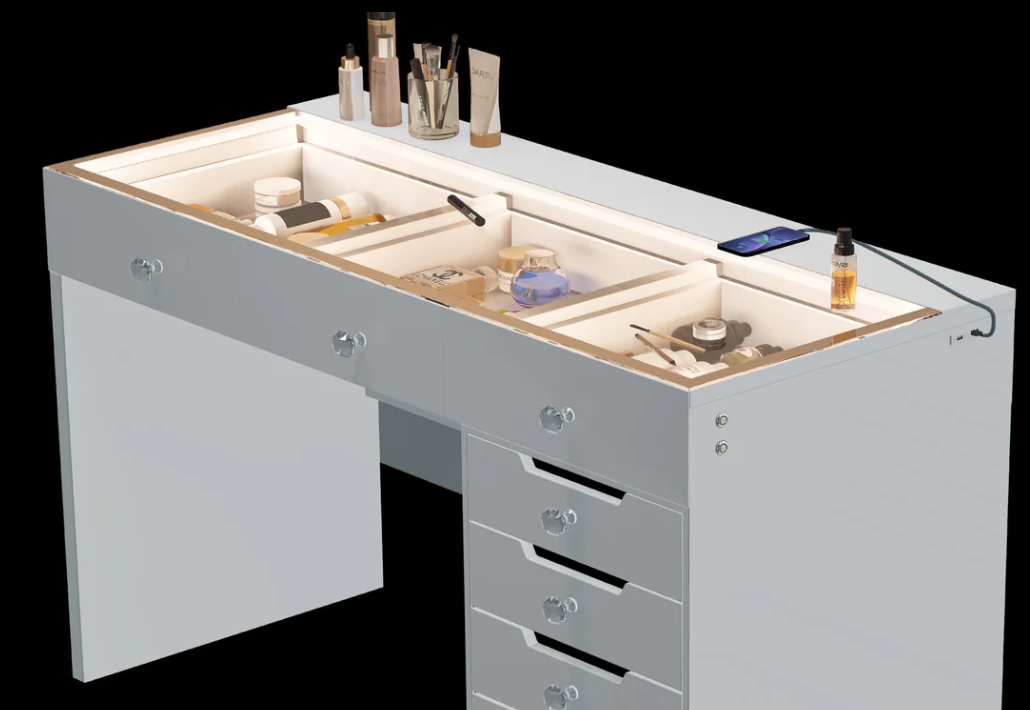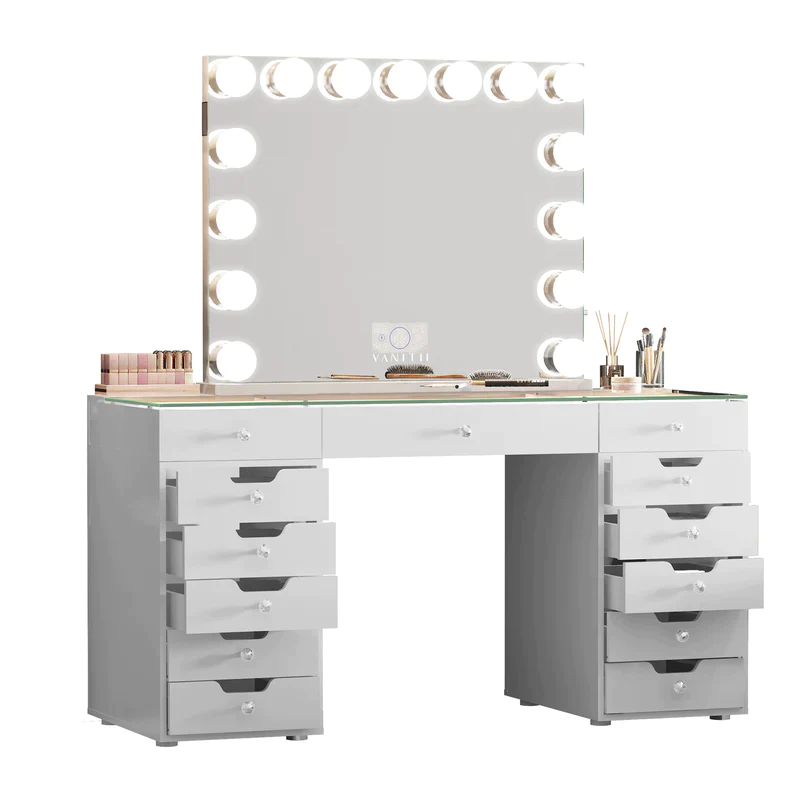When it comes to choosing the perfect vanity desk, stability, affordability, and customization options are crucial factors to consider. While various materials are available in the market, medium-density fiberboard (MDF) has gained popularity in recent years due to its unique combination of these qualities. In this blog post, we'll explore the pros and cons of common vanity desk materials and explain why MDF is the best choice for most people.
A Quick Reference for Comparing Various Vanity Desk Materials
|
Material |
Pros |
Cons |
|
MDF |
- Budget-friendly - Easy to customize - Resists warping and cracking - Made from recycled materials |
- Vulnerable to moisture if not sealed - Less impact-resistant than solid wood |
|
Solid Wood |
- Classic, timeless look - Refinishable and repairable - Durable and long-lasting |
- Pricier than MDF or plywood - Affected by humidity and temperature - Heavy and harder to move |
|
Plywood |
- Strong and stable - Lightweight and easy to move - Cheaper than solid wood |
- Less attractive edge grain - Can cost more than MDF |
|
Metal |
- Extremely durable - Resistant to moisture, warping, and pests - Modern, sleek look |
- Prone to scratches and dents - Limited style options - Potentially more expensive |
Medium-Density Fiberboard (MDF)

Medium-density fiberboard, or MDF, is an engineered wood product that offers a perfect balance of stability, affordability, and versatility for vanity desks.
What is MDF, and how is it made?
MDF is created by breaking down hardwood or softwood residuals into fine wood fibers, which are then combined with resin and wax under high pressure and temperature. This process results in a dense, uniform board that is stable and free from knots and grain irregularities found in natural wood.
Advantages of MDF for vanity desks
- Affordable and cost-effective:MDF is often more budget-friendly than solid wood, making it an accessible option for many homeowners and designers.
- Smooth, customizable surface:The uniform surface of MDF allows for easy painting, laminating, or veneering to match any desired aesthetic.
- Resistant to warping and cracking:MDF's stability is a key advantage, as it is less prone to warping or cracking due to humidity or temperature changes compared to solid wood.
- Eco-friendly:MDF is often made from recycled wood fibers, making it a more sustainable choice than solid wood.
How to Address the disadvantages of MDF
- Moisture resistance:While MDF can be susceptible to moisture damage if not properly sealed, this can be easily mitigated by following best practices for maintenance and care.
- Impact resistance:Although MDF may be less impact-resistant than solid wood, its overall stability and durability make it a reliable choice for most vanity desk applications.
By understanding the benefits and limitations of MDF, you can enjoy a beautiful, stable, and long-lasting vanity desk that perfectly complements your space and meets your needs.
Solid Wood, Plywood, and Metal: Comparing Alternative Vanity Desk Materials
While MDF is an excellent choice for most vanity desks, it's essential to consider other materials and their unique characteristics to make an informed decision. Let's take a closer look at solid wood, plywood, and metal to help you determine which material best suits your needs and preferences.
Solid Wood: Traditional Elegance and Durability
Pros:
- Timeless beauty:Solid wood offers a classic, elegant appearance that can elevate the look of any vanity desk.
- Refinishing potential:Unlike MDF, solid wood can be sanded, stained, and refinished multiple times, allowing you to refresh the look of your vanity desk or repair minor damages.
- Durability:When properly cared for, solid wood vanity desks can last for generations, making them a worthwhile investment for those who prioritize longevity.
Cons:
- Higher cost:Solid wood vanity desks are often more expensive than those made from MDF or plywood due to the cost of raw materials and the craftsmanship involved.
- Susceptibility to environmental factors: Changes in humidity and temperature can cause solid wood to expand, contract, warp, or crack over time, which may affect the appearance and functionality of your vanity desk.
- Weight:Solid wood vanity desks are generally heavier than those made from MDF or plywood, which can make them more difficult to move or transport.
Plywood: A Strong and Lightweight Option
Pros:
- Strength and stability: Plywood's cross-grain construction provides excellent strength and stability, making it resistant to warping and splitting.
- Lightweight:Compared to solid wood, plywood is lighter in weight, which can make it easier to install or move your vanity desk when needed.
- Affordability:While plywood can be more expensive than MDF, it is often more affordable than solid wood, making it a good middle-ground option.
Cons:
- Aesthetic limitations:The visible edge grain of plywood may be less attractive than the smooth surface of MDF or the natural grain of solid wood, which can limit its aesthetic appeal.
- Potential for higher costs:Depending on the grade and thickness of the plywood, it can be more expensive than MDF, which may impact your budget.
Metal: Unmatched Durability and Modern Appeal
Pros:
- Exceptional durability:Metal vanity desks are incredibly durable and resistant to impacts, scratches, and everyday wear and tear, making them a long-lasting investment.
- Resistance to environmental factors:Unlike wood-based materials, metal is not susceptible to moisture damage, warping, or pest infestations, ensuring that your vanity desk remains in excellent condition.
- Modern aesthetic:Metal vanity desks offer a sleek, contemporary look that can complement a variety of design styles and preferences.
Cons:
- Susceptibility to scratches and dents: Although metal is highly durable, it can still be scratched or dented, particularly if not properly cared for or if exposed to heavy impacts.
- Limited style options:Compared to wood-based materials, metal vanity desks may have fewer style options, as they cannot be easily painted, stained, or customized to achieve different looks.
- Potential for higher costs:Due to their durability and modern appeal, metal vanity desks may be more expensive than those made from MDF, plywood, or solid wood.
When choosing the best material for your vanity desk, consider your budget, desired aesthetic, and the level of maintenance you're willing to undertake. By weighing the pros and cons of each option and prioritizing your specific needs, you can make an informed decision and select the material that best suits your lifestyle and design preferences.
Why MDF is the Best Choice for Most Vanity Desks
For selecting the perfect material for your vanity desk, MDF stands out as the best choice for most people. Its unique combination of stability, durability, affordability, and customization options makes it an ideal solution for a wide range of needs and preferences.
1. Stability and Durability
One of the key advantages of MDF is its uniform density and resistance to warping and cracking. Unlike solid wood, which can be affected by changes in humidity and temperature, MDF maintains its shape and stability over time. This means that your MDF vanity desk will remain sturdy and functional for years to come, even in environments with fluctuating conditions.
2. Affordability
Another significant benefit of MDF is its affordability compared to other materials like solid wood or metal. By choosing an MDF vanity desk, you can achieve the look and functionality you desire without exceeding your budget. This cost-effectiveness makes MDF an attractive option for homeowners, renters, and designers looking to balance style and affordability.
3. Balancing Practicality and Style
While MDF may not be as inherently sturdy as metal or solid wood, its combination of features makes it the most practical choice for the majority of homeowners and designers. By properly sealing and maintaining your MDF vanity desk, you can enjoy a stable, long-lasting, and stylish addition to your space without compromising on affordability or customization options.
Tips for Choosing and Maintaining an MDF Vanity Desk
- Select a high-quality MDF vanity desk from a reputable manufacturer, like VANITII, to ensure the best possible stability and durability.
- Opt for a vanity desk with a durable, moisture-resistant finish to protect the MDF from potential water damage.
- Follow the manufacturer's recommendations for proper care and maintenance, including regular cleaning and avoiding exposure to excessive moisture.
- If you plan to customize your MDF vanity desk, choose a compatible paint, laminate, or veneer and apply it according to the manufacturer's instructions for the best results.
Considering these factors and following these tips helps make an informed decision and enjoy all the benefits that an MDF vanity desk has to offer. With its perfect balance of stability, durability, affordability, and customization options, MDF is truly the best choice for most people seeking a stylish and practical vanity desk solution.

Choose MDF Vanity Desks for Your Dream Bedroom
MDF vanity desks offer the perfect combination of stability, durability, affordability, and customization options, making them the ideal choice for most people seeking a stylish and practical bedroom furniture solution. Despite the unique advantages of solid wood, plywood, and metal, MDF's resistance to warping and cracking, smooth and customizable surface, cost-effectiveness, and eco-friendly nature make it the most well-rounded option. By following the tips for choosing, maintaining, and personalizing your MDF vanity desk, you can create a beautiful, functional, and long-lasting centerpiece that perfectly reflects your taste and complements your bedroom décor.
Read More
- VANITII's Guide: Achieve a Streak-Free Shine on Your Makeup Mirror
- Practicality of Automatic Sensor Lights for Vanity Desk Drawers
- Exploring Makeup Mirrors: A VANITII Vanity Desk Review
- VANITII Tempered Glass Vanity Mirrors: Say Goodbye to Mirror Fall Worries
- Hollywood Mirror With Lights: The Ultimate Guide to Choose the Perfect




Leave a comment
This site is protected by hCaptcha and the hCaptcha Privacy Policy and Terms of Service apply.